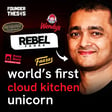
Pankaj Bansal on Building PeopleStrong into India’s HR Tech Leader
From services to SaaS: how Pankaj Bansal scaled PeopleStrong into an APAC-ready HCM and payroll platform, spun out Taggd (RPO), exited Wheebox to ETS, and brought Goldman Sachs in to fuel GCC expansion. If you care about HR tech, payroll compliance, and AI in recruiting, this is a playbook episode.
Pankaj traces the early downturn that forced hard choices, the 2011–12 pivot to cloud HR, and the product-first discipline that turned a services engine into an enterprise HCM OS. We unpack the build–spin-out–exit strategy (Taggd, Wheebox), the Goldman Sachs majority stake and what it unlocks, and why compliance is the new UX in India (DPDP, labour codes). We also dive into AI with Google Cloud, skills graphs, and how CHRO buying has shifted. Come for the founder journey; stay for the crisp lessons on go-to-market, profitability in SaaS, and scaling from India to GCC/APAC.
- Building PeopleStrong’s HR OS: services → SaaS
- Taggd & Wheebox: spin-outs, exits, compounding
- Surviving a downturn, funding, and strategic M&A
- AI in HR: copilots, matching, skills graphs
- GCC expansion playbook: logos, localization, sales motion
- Compliance, DPDP & payroll: why CHROs switch vendors
Subscribe to the Founder Thesis Podcast
Follow Akshay Datt on LinkedIn for exclusive content
Visit founderthesis.com for more founder stories
Chapters:
00:00 – Pankaj Bansal’s Founder Journey
04:30 – Services to SaaS: The Cloud Pivot
12:10 – Building PeopleStrong’s HR OS
19:45 – Taggd & Wheebox: Spin-outs to Exits
27:30 – Funding Rounds & Goldman Sachs Deal
34:50 – AI in HR: Google Cloud & Copilots
42:20 – GCC Expansion: APAC to Middle East
49:40 – Compliance, DPDP & Payroll at Scale
Tags: Pankaj Bansal, PeopleStrong, Taggd, HR tech India, HCM software, payroll SaaS, recruitment process outsourcing, RPO India, AI in HR, CHRO buying trends, GCC expansion, DPDP India, labour codes India, enterprise SaaS India, APAC HR software, Goldman Sachs India deal, ETS Wheebox, founder thesis podcast, India startup stories, scaling SaaS profitability
#FounderThesis #PankajBansal #PeopleStrong #Taggd #HRTech #HCM #Payroll #SaaS #Recruiting #AIinHR #IndiaStartups #APAC #GCC #Compliance #DPDP



















